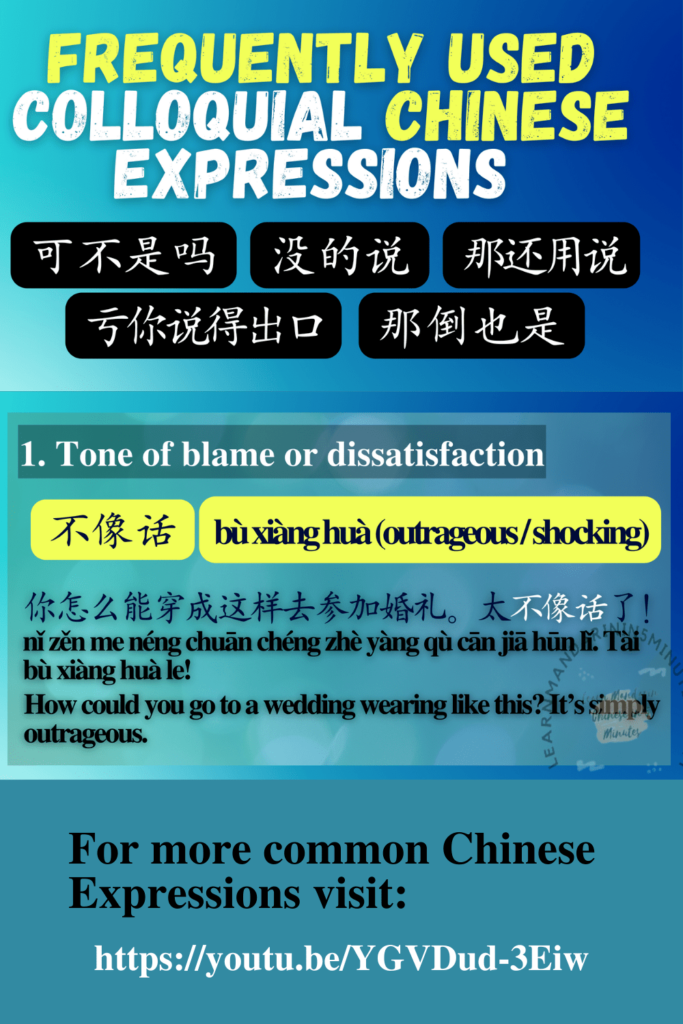Learning colloquial Chinese Expressions 惯用语 is essential if you want to have a better understanding of the Chinese culture and historical background. However, it is not easy to learn because the meaning of these expressions is different in writing and in speech.

Colloquial Chinese Expressions expressing tone of voice, manner and attitude
1. Tone of blame or dissatisfaction
不像话 bù xiànghuà ( outrages / shocking)
你怎么能穿成这样去参加婚礼。太不像话了!
nǐ zěn me néng chuān chéng zhè yàng qù cān jiā hūn lǐ. Tài bù xiàng huà le!How could you go to a wedding wearing like this? It’s simply outrageous.
气人 qì rén (to annoy / irritating)
刚买的手机坏了,真气人!
gāng mǎi de shǒu jī huài le, zhēn qì rén!The mobile phone I just bought spoiled. Really annoying!
亏你说得出口 kuī nǐ shuō dé chū kǒu (You have the nerve)
这种大逆不道的话,亏你说得出口。
zhè zhǒng dà nì bù dào de huà, kuī nǐ shuō de chū kǒu.You have the nerve to say such rebellious words.
怎么搞的 zěn me gǎo de (How did it happen? What went wrong? What’s the matter?)
你今天是怎么搞的,总说错话。
nǐ jīn tiān shì zěn me gǎo de, zǒng shuō cuò huà.What is wrong with you today, keeps saying the wrong things?
别提了 bié tí le (say no more; don’t bring it up; drop the subject)
这么丢脸的事就别提了!
Zhè me diū liǎn de shì jiù bié tí le!Let’s not bring up those embarrassing things anymore!
见鬼 jiàn guǐ(be absurd/incredible/preposterous)
我明明把钱包放在这儿,怎么就不见了?见鬼了!
wǒ míng míng bǎ qián bāo fàng zài zhè'er, zěn me jiù bù jiàn le? Jiàn guǐ le!I clearly placed the wallet over here, why has it disappeared? What the heck!
2. Tone expressing agreement or disagreement
Expressing agreement –
那还用说 nà hái yòng shuō ( needless to say)
A: 明天你会参加我的毕业典礼吧。
míng tiān nǐ huì cān jiā wǒ de bì yè diǎn lǐ ba.
You will attend my graduation ceremony tomorrow, right?
B: 那还用说,我一定准时到。
Nà hái yòng shuō, wǒ yī dìng zhǔn shí dào.
Needless to say, I will be there on time.
没的说 méi de shuō (ok, of course, no problem, goes without saying)
这餐厅的服务态度真是没的说。zhè cān tīng de fú wù tài dù zhēn shi méi de shuō.It goes without saying that the service attitude of this restaurant is very good.
Expressing disagreement –
谁说的 shéi shuō de (Who told you?)
A: 听说玛丽快结婚了。
tīng shuō Mǎlì kuài jié hūn le.
Heard Mary is getting married soon.
B:谁说的?
shéi shuō de?
Who said so? Beats me.
走着瞧吧 zǒu zhe qiáo ba (wait and see)
A: 这盘棋你输定了。
zhè pán qí nǐ shū dìng le.
You will surely lose this chess game.
B: 比赛还没结束,走着瞧吧。
bǐ sài hái méi jié shù, zǒu zhe qiáo ba.
The game isn’t over yet, wait and see.
3. Tone expressing affirmation or uncertainty
Expressing affirmation –
八成 bā chéng (most likely, probably)
这劳力士八成是山寨版。zhè láo lì shì bā chéng shì shān zhài bǎn.This Rolex is most likely a copy cat version.
一口咬定 yī kǒu yǎo ding (speak with certainty, no doubt )
他还没弄清事实就一口咬定小明偷了他的手机。tā hái méi nòng qīng shì shí jiù yī kǒu yǎo dìng xiǎo míng tōu le tā de shǒu jī.Before he could establish the truth, he insisted that xiao ming stole his mobile phone.
Expressing uncertainty –
死了这条心吧 sǐ le zhè tiáo xīn ba ( perish the thought / fat chance)
玛丽是不会看上你的。你还是死了这条心吧!Mǎlì shì bù huì kàn shàng nǐ de. Nǐ hái shì sǐle zhè tiáo xīn ba!Mary will not be interested in you. Perish the thought!
没戏 méi xì (not a chance / beyond hope)
以你这样的成绩还想考上名校!没戏!nǐ nǐ zhè yàng de chéng jī hái xiǎng kǎo shàng míng xiào! Méi xì!With grades like yours, you still want to be admitted to a prestigious school? Not a chance!
If you are interested to learn more about 惯用语 (colloquial Chinese expressions), do visit our youtube channel for more examples and pronunciation.
